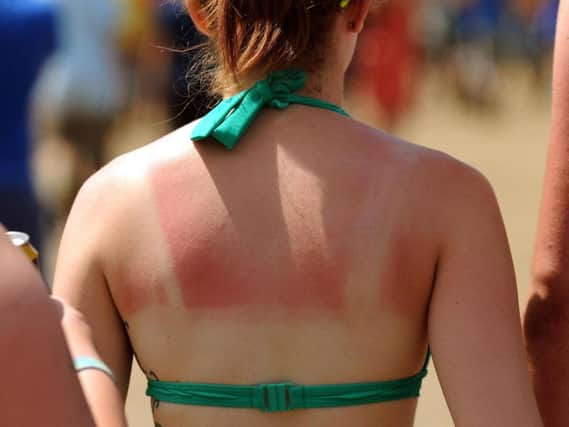7 ways to limit the damage if you get sunburnt this summer


The British Skin Foundation (BSF) has issued a list of handy 'dos' and 'don'ts' which will help soothe the pain if you do caught out while on holiday.
1. Act quickly and get out of the sunCover up the affected areas and stay in the shade until your sunburn has healed. Wear loose cotton clothing that allows your skin to “breathe” over the sunburnt areas.


Advertisement
Hide AdAdvertisement
Hide Ad2. Take over-the-counter pain reliefAnalgesia or painkillers can help relieve the pain and reduce inflammation caused by sunburn. Non-steroidal anti-inflammatory drugs such as ibuprofen are ideal and should be continued for a period of at least 48 hours if there are no contraindications. Paracetamol will help with pain, but has little effect on inflammation.
3. Cool the skinApply a cool compress to the skin, eg a towel dampened with cool water, for 15 minutes, or take a cool bath or shower. Aim to keep the temperature just below lukewarm. Make sure the shower has a gentle flow of water rather than being on full power. If blisters are starting to develop, then a bath is preferable. Do not rub your skin with a towel, but gently pat it dry when you get out.
4. MoisturiseAfter a bath or shower, use an unperfumed cream or lotion to soothe the skin. Repeated applications are necessary to reduce the appearance of peeling and this may need to be continued for several weeks. Aloe vera or soy containing gels or lotions can be beneficial in soothing the skin. Aloe vera not only has a cooling effect on the skin, but also acts as an anti-inflammatory. Be wary of using creams or lotions that contain petroleum, benzocaine, or lidocaine. These can either trap heat in the skin or cause local skin irritation.
5. Stay hydratedSunburn can encourage fluid loss through the skin. Drinking plenty of water will prevent dehydration and help your body recover. Alcohol should ideally be avoided during this time, as it will make dehydration worse


Advertisement
Hide AdAdvertisement
Hide Ad6. Use of mild steroid creamUsing a weak steroid cream such as 0.5-1% hydro-cortisone for 48 hours may decrease pain and swelling caused by sunburn and speed up the healing process. This is best avoided in small children.
7. Leave blisters aloneTry not to pop blisters, as this can lead to infection and scarring. They will settle by themselves after a few days. In the meantime, treat the skin gently.
Dr Anjali Mahto, a consultant dermatologist, and spokesman for the BSF, said: "Sunburn is an acute reaction in the skin that follows excessive over-exposure to ultraviolet (UV) radiation.
"It causes direct damage to DNA, resulting in inflammation and death of skin cells. The risk is higher in equatorial areas or at altitude, particularly in those with fair skin types.
Advertisement
Hide AdAdvertisement
Hide Ad"Sunburn in childhood or adolescence can double the risk of developing melanoma in later life.”
* For more tips on staying safe in the sun, visit the website of It Takes Seven, the British Skin Foundation's skin cancer appeal, HERE.